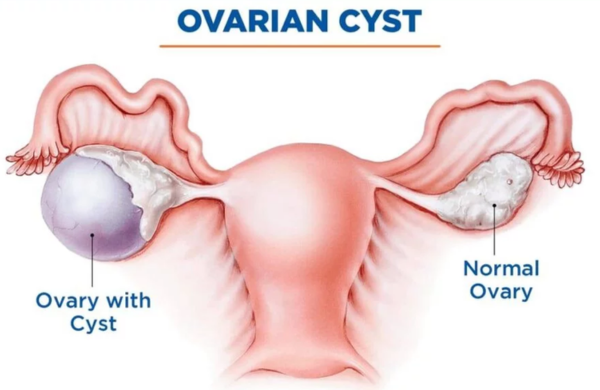Laparoscopic Ovarian Cystectomy in Noida
What is Laparoscopic Ovarian Cystectomy?
A less invasive surgical technique for ovarian cyst removal is laparoscopic ovarian cystectomy. This surgery minimises scars, pain, and recovery time by using small incisions in the abdomen, in contrast to previous open surgery methods. It is advised for ovarian cysts and is usually carried out under general anaesthesia.

Why Would a Laparoscopic Ovarian Cystectomy Be Performed?
Women who are suffering from conditions like the following may benefit from a laparoscopic ovarian cystectomy:
Ovarian Cysts:
These growths on the ovaries can cause pain, discomfort, and in rare cases, more serious problems.
Endometriosis:
A condition in which endometrial tissue grows outside the uterus, leading to pelvic pain and ovarian cysts.
PCOS :
Polycystic Ovary Syndrome or PCOS frequently results in the development of numerous ovarian cysts.
Infertility:
Ovarian cysts may need to be removed if they prevent a woman from becoming pregnant.
How to Prepare for a Laparoscopic Ovarian Cystectomy?
Before undergoing a laparoscopic ovarian cystectomy, patients typically follow these guidelines:
Medical Evaluation:
You'll undergo a thorough medical evaluation to ensure you're in good health for the surgery.
Medication Adjustment:
Your doctor may advise you to stop certain medications that can increase bleeding risk.
Fasting:
You'll be instructed not to eat or drink for a specified time before the procedure.

What Happens During a Laparoscopic Ovarian Cystectomy?
Laparoscopic ovarian cystectomy is a surgical intervention in which a small incision is made in the abdomen through which gas is inflamed into the stomach, and then the gas is blown down the pelvis to access the ovaries. Following that, 2 or 3 small incisions are made in the abdominal wall, each about half an inch to an inch in length. Trocars (thin, hollow tubes) are inserted through these incisions to provide access to surgical instruments and a laparoscope.
A Laparoscope is a thin tube-shaped microscope with a light at the end. Doctors use this medical instrument to get clear access to the internal organs.
The main goal of ovarian cystectomy is to remove the excess ovarian tissue while preserving the original tissue as much as possible.

What Should You Expect After A Laparoscopic Ovarian Cystectomy?
Following the surgery, you may experience the following:
Postoperative Pain:
It may take a few days before pelvic and abdominal pain subsides.
Fatigue:
You may feel exhausted or weak for a few days post-surgery, so resting and sleeping are important.
Restrictions:
For a couple of weeks post-op, you will be asked to avoid strenuous activities or workouts.

Potential Benefits of Laparoscopic Ovarian Cystectomy:
Minimally Invasive:
Compared to standard surgery, this less invasive method has a shorter recovery period and causes less discomfort.
Minimal Scarring:
Scars from these tiny incisions are less obvious.
Shorter Hospital Stay:
After laparoscopic ovarian cystectomy surgery, patients usually go home in 2 to 3 days and return to their daily life sooner.
The Cost of Laparoscopic Ovarian Cystectomy in Noida, India
The price of a laparoscopic ovarian cystectomy in Noida varies based on the complexity of the operation, the hospital or clinic, the surgeon’s fees, and the medical history of the patient. Choosing the right hospital and gynaecologist with extensive training and experience is crucial for a successful and safe treatment.
Renowned laparoscopic surgeon Dr. Neha Gupta practises in Noida and Delhi-NCR. She has performed numerous laparoscopic gynaecological procedures, including laparoscopic ovarian cystectomy in Noida.
Reach out to Dr. Neha Gupta at The Gyne Clinic if you’re looking for a laparoscopic surgeon in Noida.
For Appointments
Get in touch with us
docnehanigam@gmail.com
Address
Fortis Hospital, Sector 62, Noida
Timings : 9am to 5 pm, Monday to Saturday
Get Direction
Address 2
The Gyne Clinic, Ganga Shopping Complex, Sector 29, NOIDA (Near Botanical garden metro station)
Timing : 5pm to 8 pm, Monday to Saturday
Sunday : By Appointments

We at thegyneclinic are committed to provide competent and compassionate care. Your health matters to us!
- +918800606562
- docnehanigam@gmail.com
- The Gyne Clinic, Ganga Shopping Complex, Sector 29, Noida
- The Department of Obstetrics and Gynecology, Fortis Hospital, Noida
Our Treatments
We are Available
Fortis Hospital, sector 62 Noida
Timings: 9am to 5 pm, Monday to Saturday
The Gyne Clinic, Ganga Shopping Complex, Sector 29 Noida
Timings: 5pm to 8 pm, Monday to Saturday
Sunday: By Appointments